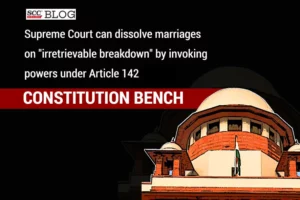Supreme Court: A Constitution Bench comprising of Sanjay Kishan Kaul, Sanjiv Khanna*, A.S. Oka, Vikram Nath, and J.K. Maheshwari, JJ. has held that that the mandatory waiting period of six months for divorce by mutual consent can be dispensed with subject to the requirements and conditions laid down in Amardeep Singh v. Harveen Kaur, (2017) 8 SCC 746 and Amit Kumar v. Suman Beniwal, 2021 SCC OnLine SC 1270. Further, it was held that it is possible for the Court to dissolve the marriage on the ground of irretrievable breakdown of marriage.
The original issue was whether the mandatory waiting period for divorce by mutual consent as prescribed under Section 13-B of the Hindu Marriage Act, 1955 could be waived. However, during the hearing, the Bench decided to also consider the issue of whether the power under Article 142 of the Constitution of India is inhibited in any manner in a scenario where there is an irretrievable breakdown of marriage in the opinion of the Court, but one of the parties is not consenting to the terms.
The Court said that Article 142(1) of the Constitution has seemingly unhindered this tempered and bound by restraint which must be exercised based on fundamental considerations of general and specific public policy. Fundamental general conditions of public policy referred to fundamental rights, secularism, federalism, and other basic features of Constitution of India. Whereas specific public policy should be understood as some express provision in any substantive law and not stipulated a requirement to a particular statutory scheme. It should not be confined to a fundamental and non derogable principle at the core of the statute. It was never doubted or debated that the Supreme Court is empowered under Article 142(1) to do complete justice without being bound by the relevant procedure, if it is satisfied that it is necessary to depart from the procedure to do complete justice.
Thus, the Court held that period of 6 months can be dispensed with, as specified in the two judgments of this Court in Amardeep Singh (supra) and Amit Kumar (supra). Further, it has been held that it is possible for the Court to dissolve the marriage on the ground of irretrievable breakdown of marriage, that will not contravene the specific or fundamental principles of public policy.
The Court also laid down the factors to be kept in mind by the Court while deciding when there is irretrievable breakdown of marriage and how to balance out equities, especially with regard to maintenance, alimony, economic rights of children.
[Shilpa Sailesh v. Varun Sreenivasan, 2023 SCC OnLine SC 544]
*Judgment read by: Justice Sanjiv Khanna
Source: Constitution Bench (Live streaming)

